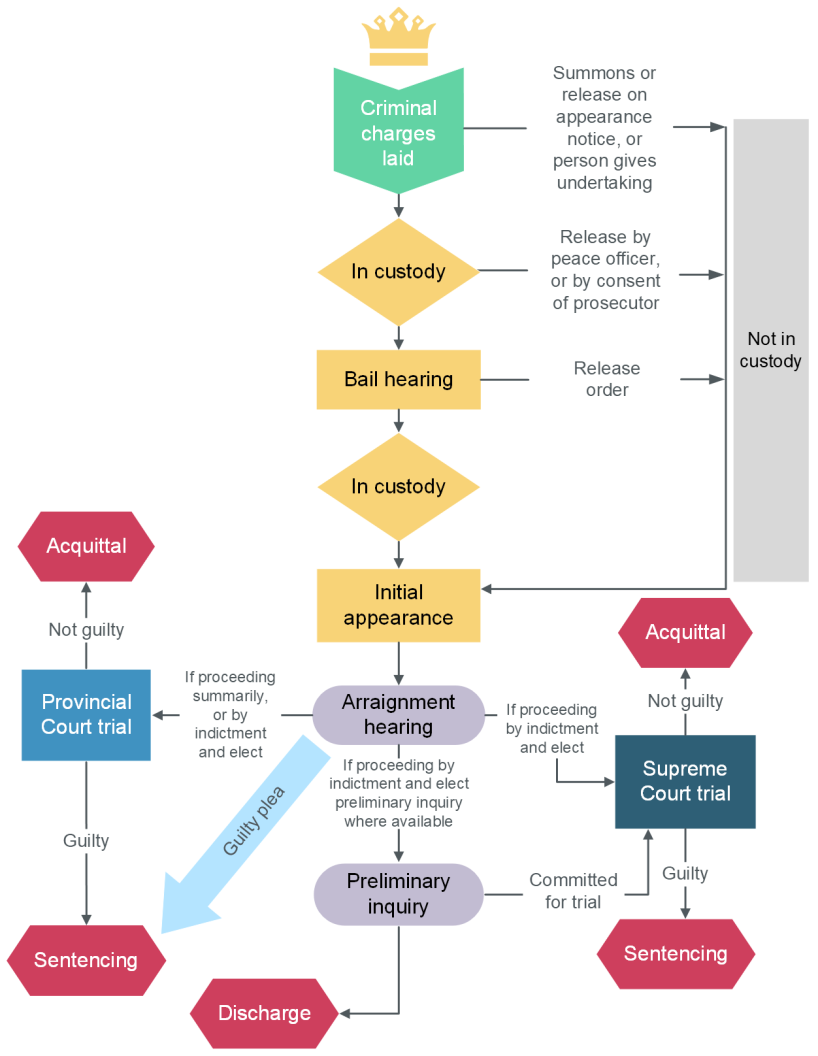Charges and types of offences
Criminal charge process, types of criminal offences and the courts where trials are held in BC.

Criminal charge process
The Court is not involved with the process of laying a charge. Crown prosecutors decide whether criminal charges should be laid.
Police investigate alleged crimes and gather evidence
The police prepare and submit a Report to Crown Counsel
Crown counsel<p>Independent lawyers with the federal or provincial prosecution service. Crown counsel do not represent the government, police or victim of crime. Rather, they perform their function on behalf of the public. Crown counsel may also be referred to as Crown, Crown prosecutors or prosecutors.</p> assess if and what charges are laid, and against whom
If you are charged with a crime and held in jail, there will be a bail<p><span lang="EN-US">An order made by a judicial justice or a judge releasing an accused person from jail until their trial and requiring them to obey certain conditions (rules) and return to court on a specific date. The legal term for bail is “judicial interim release”.</span><span> </span></p> hearing.
Whether or not you are held in jail, there will also be an initial appearance<p>Sometimes called a first appearance. When an accused person attends court and a judicial case manager, justice of the peace, or judge tells them what offence or offences they are charged with.</p> before the Court.
Types of criminal offences and where trials are held
Over 95% of all criminal cases in BC are heard in Provincial Court.
There are three types of criminal offences (crimes). Depending on the type of offence, the trial may happen in the Provincial Court or the Supreme Court.
Summary offences
Summary offences are less serious crimes with less severe punishment
Examples of summary offences are creating a disturbance, joyriding, dining and dashing
Summary court process is simpler
Maximum penalty for a summary offence is usually a $5,000 fine and/or six months in jail, although some summary offences have higher maximum sentences
Summary offences can only be dealt with in Provincial Court
Indictable offences
Indictable offence are more serious crimes with more severe punishment. Examples include breaking and entering and aggravated assault
The indictable court process is more complex
Maximum penalties for indictable offences vary and can include life in prison. Some indictable offences have minimum penalties
People charged with most indictable offences may choose (elect) whether to have their trial in Provincial Court or in the BC Supreme Court
If a person elects to have their trial in the BC Supreme Court, they must also choose whether to be tried by a judge alone or a judge and jury
All jury trials in BC take place in the Supreme Court. There are no jury trials in Provincial Court.
Hybrid offences
Crown counsel must decide (elect) whether to treat the matter as a summary offence or an indictable offence
Examples of hybrid offences include theft under $5000, assault, impaired driving
Some types of hybrid offences will always proceed in Provincial Court whether the Crown chooses to treat the offence as summary or indictable (example: theft under $5,000)
If Crown counsel chooses the summary process, the trial will be in Provincial Court
If Crown counsel chooses the indictable process, in most cases, the person charged may choose whether to proceed in Provincial Court or in the BC Supreme Court
This page was printed from:
https://provincialcourt.bc.ca/navigating-court-case/criminal-adult-and-youth/steps-criminal-case/charges-and-types-offences
